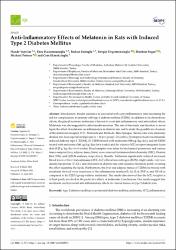Anti-inflammatory effects of melatonin in rats with induced type 2 diabetes mellitus

Göster/
Tarih
2022Yazar
Yapışlar, HandeHacıosmanoğlu, Ebru
Sarıoğlu, Türkan
Değirmencioğlu, Sevgin
Söğüt, İbrahim
Poteser, Michael
Ekmekçioğlu, Cem
Üst veri
Tüm öğe kaydını gösterKünye
Yapislar, H.; Haciosmanoglu, E.; Sarioglu, T.; Degirmencioglu, S.; Sogut, I.; Poteser, M.; Ekmekcioglu, C. Anti Inflammatory Effects of Melatonin in Rats with Induced Type 2 Diabetes Mellitus. Life 2022, 12, 574.Özet
Introduction: Insulin resistance is associated with a pro-inflammatory state increasing the risk for complications in patients with type 2 diabetes mellitus (T2DM). In addition to its chronobiotic effects, the pineal hormone melatonin is known to exert anti-inflammatory and antioxidant effects. Melatonin was also suggested to affect insulin secretion. The aim of this study was therefore to investigate the effect of melatonin on inflammation in diabetic rats and to study the possible involvement of the melatonin receptor, MT2. Materials and Methods: Male Sprague Dawley rats were randomly divided into four experimental groups (n = 10 per group): (1) control, (2) streptozotocin/nicotinamide induced diabetes type 2 (T2DM), (3) T2DM treated with melatonin (500 mu g/kg/day), and (4) T2DM treated with melatonin (500 mu g/kg/day for 6 weeks) and the selective MT2 receptor antagonist luzindole (0.25 g/kg/day for 6 weeks). Blood samples were taken for biochemical parameters and various tissue samples (liver, adipose tissue, brain) were removed for immunohistochemistry (IHC), Western blot (WB), and Q-PCR analyses, respectively. Results: Melatonin significantly reduced increased blood levels of liver transaminases (AST, ALT), blood urea nitrogen (BUN), triglyceride, very low-density lipoprotein (VLDL), and cholesterol in diabetic rats with luzindole treatment partly reversing this effect regarding the lipids. Furthermore, the liver and adipose tissues of T2DM rats treated with melatonin showed lower expression of the inflammatory markers IL-1 beta, IL-6, TNF-alpha, and NF-kappa B as compared to the T2DM group without melatonin. The results also showed that the MT2 receptor is at least partly involved in the protective effects of melatonin. Conclusions: Our results suggest that melatonin exerts relevant anti-inflammatory effects on various tissues in type 2 diabetic rats.
Kaynak
LifeCilt
12Sayı
4Bağlantı
https://www.mdpi.com/2075-1729/12/4/574https:// doi.org/10.3390/life12040574
https://hdl.handle.net/20.500.12780/684

















